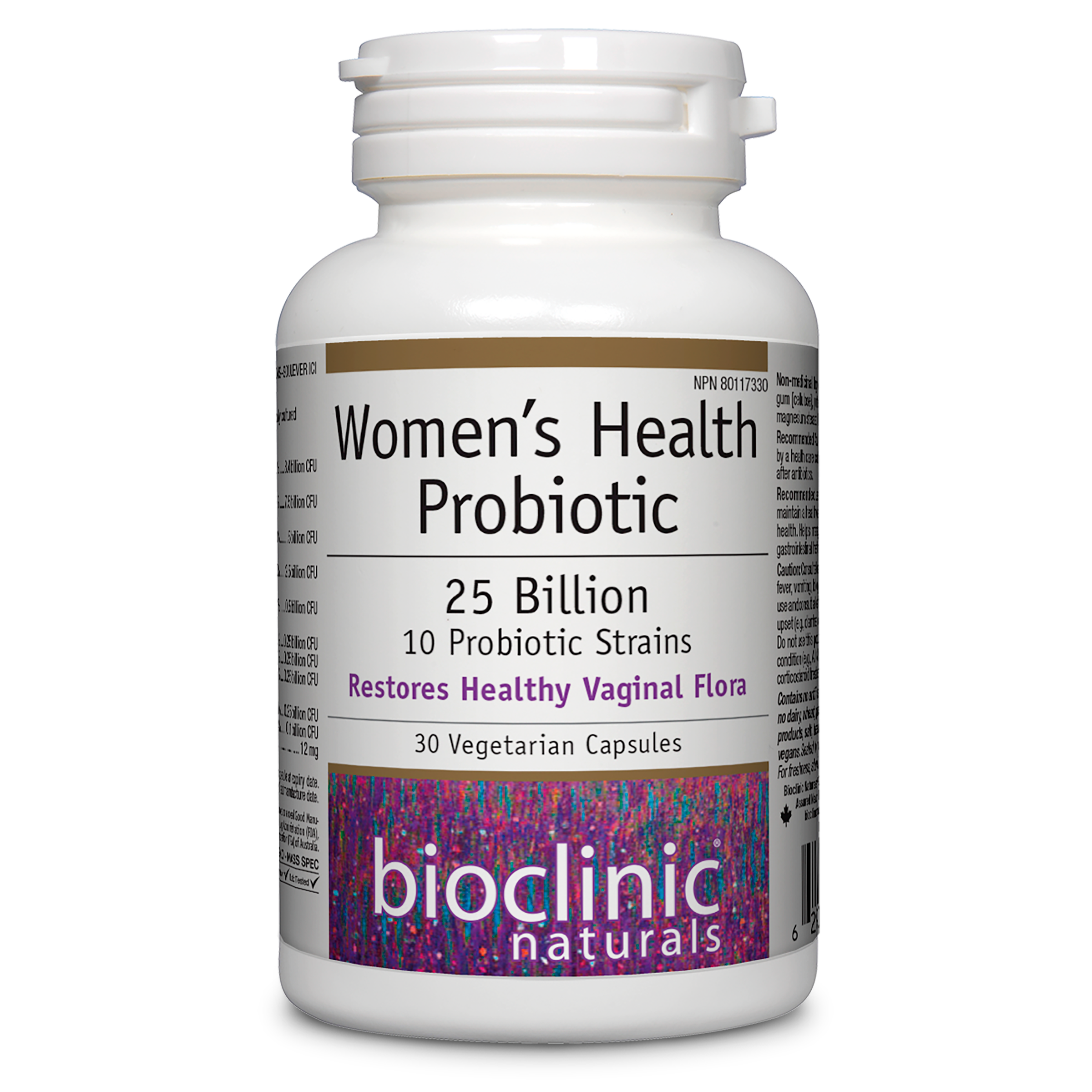
Restores Healthy Vaginal Flora
25 Billion 10 Probiotic Strains
30 Vegetarian Capsules ( SKU: 9675, NPN: 80117330 )
Benefits
- Clinically studied strain for a healthy vaginal microbiome
- Probiotic strains support the healthy growth of normal vaginal flora as well as resistance to dysbiosis and infection
- Contains 10 specific strains of Lactobacillus and Bifidobacterium and a minimum of 25 billion CFUs per single vegetarian capsule (85 billion at the date of manufacture)
- One capsule per day, oral dosing
Feature Summary
Women’s Health Probiotic provides a unique combination of multi-species probiotics that are clinically studied strains to support a healthy vaginal microbiome as well as gastrointestinal health. Comprised of 10 strains of Lactobacillus and Bifidobacterium, one capsule per day provides a clinically effective dose of 25 billion CFUs. These probiotic species support a healthy vaginal ecosystem through multiple mechanisms, including the modulation of local immunity and the production of lactic acid, hydrogen peroxide, and bacteriocins, compounds with antimicrobial effects that are effective at very low concentrations and unlikely to develop bacterial resistance.1,2 Lactobacilli normally comprise at least 70% of the vaginal microbiome, with oral probiotic supplementation providing protection from pathogens and infectious organisms, including Gardnerella vaginalis and Candida ssp.3–5
Nearly 90% of the CFUs in Women’s Health Probiotic are lactobacilli, including species shown to populate the vaginal flora following oral supplementation. Oral supplementation with L. plantarum P17630, for example, has been shown to promote vaginal growth of lactic-acid-producing bacteria, and inhibit Candida spp. overgrowth in women with recurrent vulvovaginal candidiasis.6 Similarly, vaginal growth of L. paracasei, rhamnosus, and acidophilus, as well as Bifidobacterium animalis subsp. lactis has been shown to increase following oral supplementation, providing protection against vaginal dysbiosis and infection.7
Medicinal Ingredients
| Each Vegetarian Capsule Contains: | ||
| 25 billion active cells* of the following specially cultured strains of probiotics: | ||
| Lacticaseibacillus paracasei (R0215) (whole cell) | 33.6 % | 8.4 billion CFU |
| Lacticaseibacillus rhamnosus (GG) (whole cell) | 30 % | 7.5 billion CFU |
| Lactiplantibacillus plantarum ROSELLA (P17630®) (whole cell) | 20 % | 5 billion CFU |
| Bifidobacterium animalis subsp. lactis (LAFTIB94) (whole cell) | 10 % | 2.5 billion CFU |
| Lactiplantibacillus plantarum (R1012) (whole cell) | 2 % | 0.5 billion CFU |
| Bifidobacterium longum subsp. longum (HA-135) (whole cell) | 1 % | 0.25 billion CFU |
| Lactobacillus acidophilus (R0418) (whole cell) | 1 % | 0.25 billion CFU |
| Lactobacillus helveticus (R0052) (whole cell) | 1 % | 0.25 billion CFU |
| Lacticaseibacillus rhamnosus (R0011) (whole cell) | 1 % | 0.25 billion CFU |
| Bifidobacterium bifidum (R0071) (whole cell) | 0.4 % | 0.1 billion CFU |
| Vitamin C (ascorbic acid) | 12 mg | |
| CFU: colony forming units | ||
| *Guaranteed minimum 25 billion active cells per capsule at expiry date. | ||
| Guaranteed minimum 85 billion active cells per capsule at manufacture date. | ||
Non-Medicinal Ingredients
Vegetarian capsule (carbohydrate gum [cellulose], purified water), potato starch, vegetable grade magnesium stearate (lubricant)
Dosage:
Recommended Adult Dose: 1 capsule per day or as directed by a health care practitioner. Take at least 2–3 hours before or after antibiotics
Warnings:
Consult a health care practitioner prior to use if you have fever, vomiting, bloody diarrhea, or severe abdominal pain. Stop use and consult a health care practitioner if symptoms of digestive upset (e.g., diarrhea) occur, worsen, and/or persist beyond 3 days. Do not use this product if you have an immune-compromised condition (e.g., AIDS, lymphoma, patients undergoing long-term corticosteroid treatment). Keep out of reach of children.
Allergens:
Contains no artificial colours, preservatives, or sweeteners; no dairy, wheat, gluten, soy, corn, egg, fish, shellfish, animal products, salt, tree nuts, or GMOs. Suitable for vegetarians/ vegans. Sealed for your protection. Do not use if seal is broken. For freshness, store in a cool, dry place
Contraindications
No known contraindications. Multiple strains of Lactobacillus and Bifidobacterium have been used safely during pregnancy and lactation.8
Drug Interactions
No specific interactions, should be taken 2–3 hours before or after antibiotics.
- Plaza-Diaz, J., Ruiz-Ojeda, F.J., Gil-Campos, M., et al. (2019). Mechanisms of action of probiotics. Adv Nutr, 10(1), S49-66.
- Fuochi, V., Cardile, V., Petronio, G.P., et al. (2019). Biological properties and production of bacteriocins-like-inhibitory substances by Lactobacillus sp. Strains from human vagina. J Appl Microbiol, 126(5), 1541-50.
- Miller, E.A., Beasley, D.E., Dunn, R.R., et al. (2016). Lactobacilli dominance and vaginal pH: Why is the human vaginal microbiome unique? Front Microbiol, 7, 1936.
- Mohankumar, B., Shandil, R.K., Narayanan, S., et al. (2022). Vaginosis: Advances in new therapeutic development and microbiome restoration. Microb Pathog, 168, 105606.
- Afifirad, R., Emamie, A.D., Zadeh, R.G., et al. (2022). Effects of pro/prebiotics alone over pro/prebiotics combined with conventional antibiotic therapy to treat bacterial vaginosis: A systematic review. Int J Clin Pract, 2022, 4774783.
- Vladareanu, R., Mihu, D., Mitran, M., et al. (2018). New evidence on oral L. plantarum P17630 product in women with history of recurrent vulvovaginal candidiasis (RVVC): A randomized double-blind placebo-controlled study. Eur Rev Med Pharmacol Sci, 22(1), 262-7.
- Mezzasalma, V., Manfrini, E., Ferri, E., et al. (2017). Orally administered multispecies probiotic formulations to prevent uro-genital infections: A randomized placebo-controlled pilot study. Arch Gynecol Obstet, 295(1), 163-72.
- El Dahan, K.S., Bejjani, J., Nasrallah, A.A., et al. (2022). Probiotics properties: A focus on pregnancy outcomes. Eur J Obstet Gynecol Reprod Biol, 272, 16-23.
